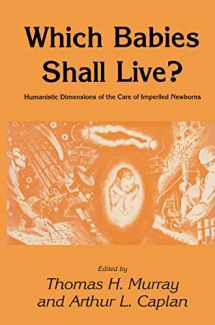
Which Babies Shall Live?: Humanistic Dimensions of the Care of Imperiled Newborns (Contemporary Issues in Biomedicine, Ethics, and Society)
ISBN-13:
9781461293927
ISBN-10:
1461293928
Edition:
1985
Author:
Arthur L. Caplan, Thomas H. Murray
Publication date:
2011
Publisher:
Humana
Format:
Paperback
240 pages
FREE US shipping
Book details
ISBN-13:
9781461293927
ISBN-10:
1461293928
Edition:
1985
Author:
Arthur L. Caplan, Thomas H. Murray
Publication date:
2011
Publisher:
Humana
Format:
Paperback
240 pages
Summary
Which Babies Shall Live?: Humanistic Dimensions of the Care of Imperiled Newborns (Contemporary Issues in Biomedicine, Ethics, and Society) (ISBN-13: 9781461293927 and ISBN-10: 1461293928), written by authors
Arthur L. Caplan, Thomas H. Murray, was published by Humana in 2011.
With an overall rating of 4.1 stars, it's a notable title among other
books. You can easily purchase or rent Which Babies Shall Live?: Humanistic Dimensions of the Care of Imperiled Newborns (Contemporary Issues in Biomedicine, Ethics, and Society) (Paperback) from BooksRun,
along with many other new and used
books
and textbooks.
And, if you're looking to sell your copy, our current buyback offer is $0.31.
Description
The fate of seriously ill newborns has captured the atten tion of the public, of national and state legislators, and of powerful interest groups. For the most part, the debate has been cast in the narrowest possible terms: "discrimination against the handicapped"; "physician authority"; "family autonomy." We believe that something much more profound is happening: the debate over the care of sick and dying babies appears to be both a manifestation of great changes in our feelings about infants, children, and families, and a reflection of deep and abiding attitudes toward the newborn, the handi capped, and perhaps other humans who are "less than" nor mal, rational adults. How could we cast some light on those feelings and attitudes that seemed to determine silently the course of the public debate? We chose to enlist the humanities-the dis players and critics of our cultural forms. Rather than closing down the public discussion, we wanted to open it up, to illuminate it with the light of history, religion, philosophy, literature, jurisprudence, and humanistically oriented sociol ogy. This book is a first effort to place the hotly contested Baby Doe debate into a broader cultural context.


We would LOVE it if you could help us and other readers by reviewing the book
Book review

Congratulations! We have received your book review.
{user}
{createdAt}
by {truncated_author}


